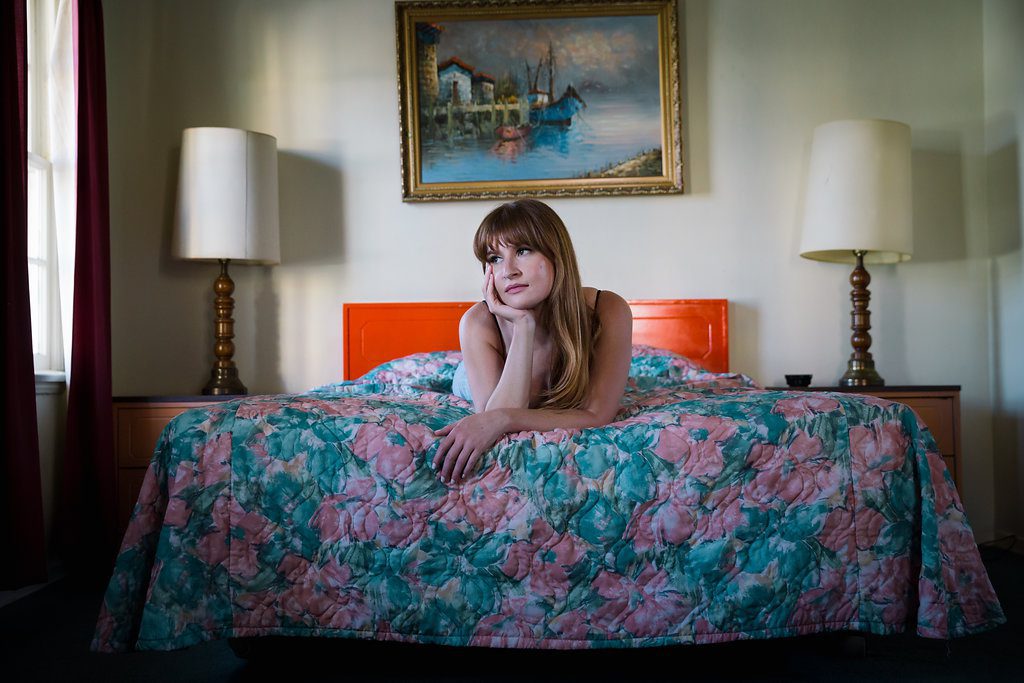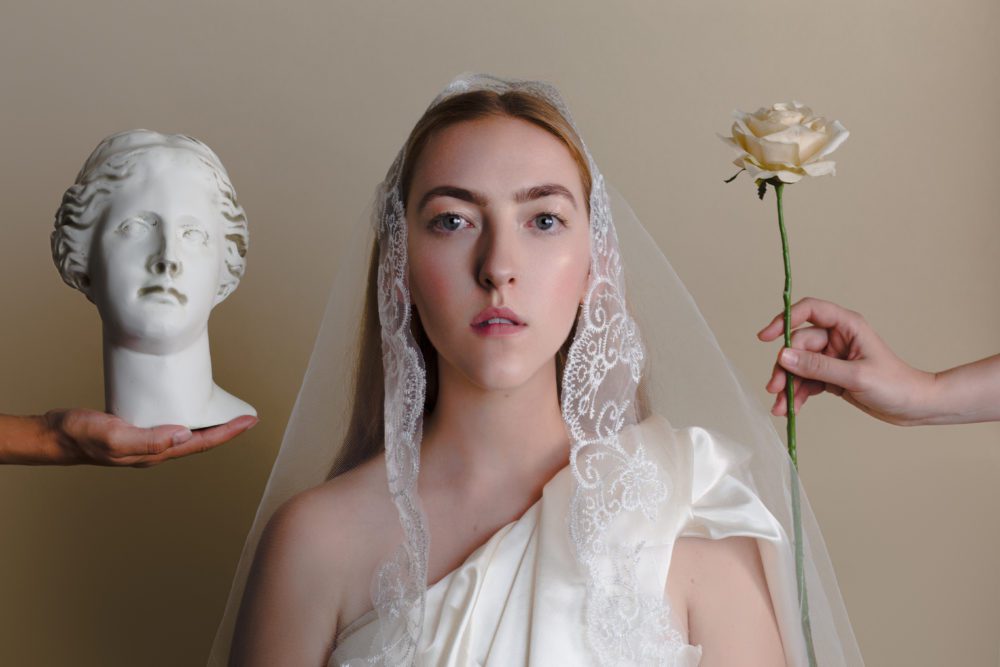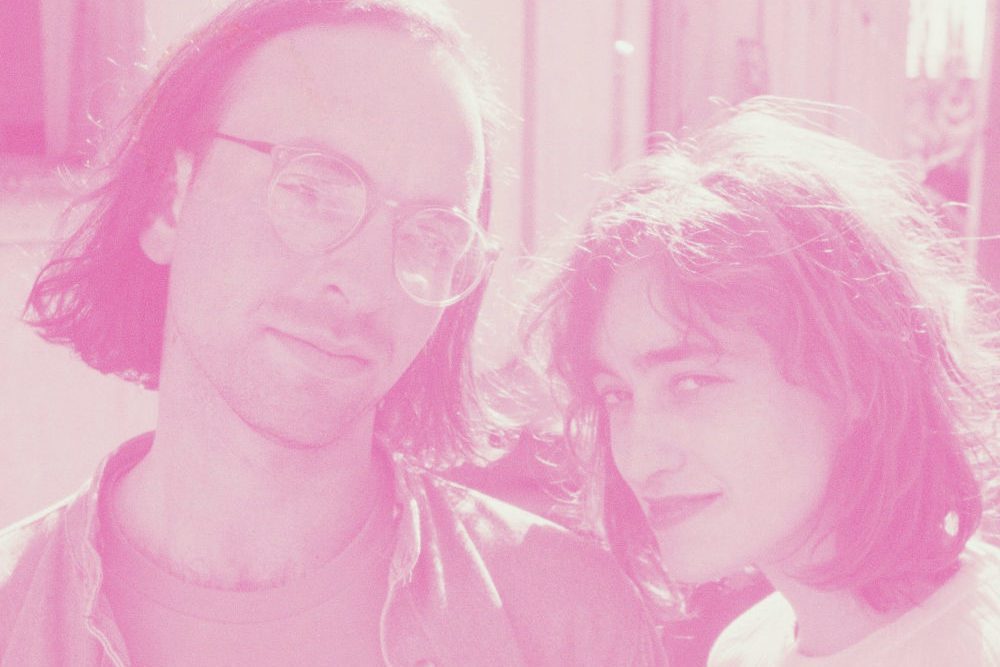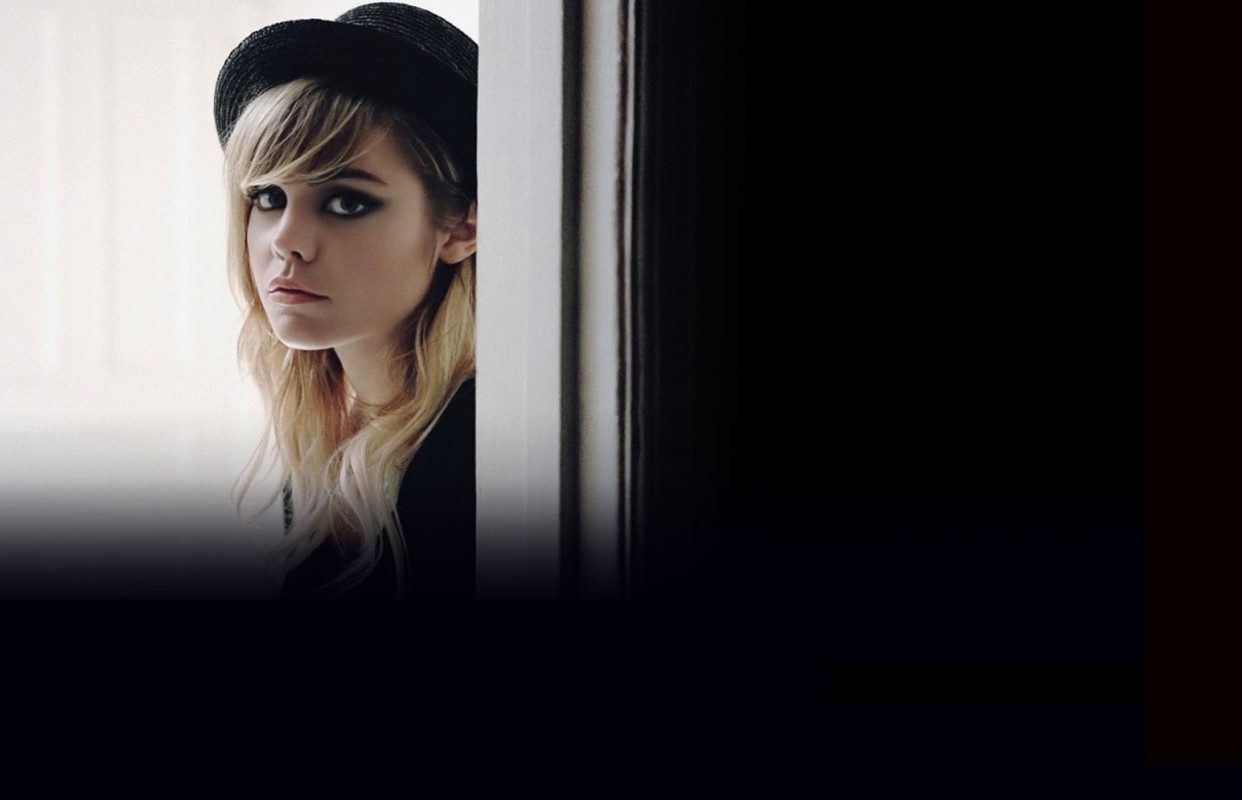
[fusion_builder_container hundred_percent=”yes” overflow=”visible”][fusion_builder_row][fusion_builder_column type=”1_1″ background_position=”left top” background_color=”” border_size=”” border_color=”” border_style=”solid” spacing=”yes” background_image=”” background_repeat=”no-repeat” padding=”” margin_top=”0px” margin_bottom=”0px” class=”” id=”” animation_type=”” animation_speed=”0.3″ animation_direction=”left” hide_on_mobile=”no” center_content=”no” min_height=”none”]
Cassandra Violet, much like Batman, lives a double life. When she’s not teaching high schoolers, she’s creating music that spans the genres of rock, folk, and pop. In the past, Violet’s music slanted toward melancholy modern folk, with songs like “Beyond The Fray” and “Lady” painting portraits of desert sands and long lost love.
Her new track “Invisible Man” is a refreshing drink on a hot day. There’s an aggressiveness, an edge to Violet’s voice that takes center stage, balancing the sweet piano and subtle horn section. In a year full of negative headlines and desperate news stories, “Invisible Man” is a sunny diversion from the darkness.
We spoke with Cassandra Violet about breaking out of her folk roots and how a horn section really does make all the difference.
AF: You’re a rare bird: a native Angelino! You grew up in Venice, which I’m sure has changed a lot since your childhood. What was it like growing up by the beach?
CV: Venice was really different when I was growing up there! It was less expensive, for one thing, so artists who weren’t wealthy could actually live there affordably. I remember there being some gun violence and gang activity. It definitely was not the Google mecca it is now. My parents still live there (both of them are artists) and every time I go over there, it’s so strange. Like everyone is under 30 and brewing their own kombucha and going to spinning classes. Not to hate on Venice!
AF: Yes, it’s all Andrew Keegan and hot yoga nowadays.
CV: It’s just this insane example of what happens when a place gentrifies the most it could possibly gentrify.
AF: In terms of the art community, do you still see it coming up out of the concrete? Or has the scene mostly moved?
CV: I know artists who still live there, but a lot of them are from my parents’ generation, I think. I know there are exceptions, but I think a lot of creative people have moved further east.
AF: At what age did you first take interest in music?
CV: I was really young when I realized I loved to sing, and that I could imitate a sound when I heard it. Also, my dad taught me how to whistle when I was little, probably around five years old. I got really, really good at whistling, better than him.
I started to play the clarinet in fourth grade, and in middle school and high school I sang and played clarinet in band and orchestra. I really loved music but I always felt really constrained playing classical music. I wanted to experiment more, and I really loved writing, but it took me a long time to sit down and write a song.
So, I guess you could say I come from more of a classical background. The only music that my parents played around the house was classical music and jazz. My dad loves Wayne Shorter. And that was a great musical education, but I had to figure out my own way of creating and accessing pop music. The point of making music for me is that it’s a pure form of expression, and it is completely free for me to do whatever I want, and become whatever person I want to become.
AF: What were some of your early pop music finds?
CV: Gosh. Ever since I can remember I have gravitated towards women singing autobiographically. When I was younger I was obsessed with No Doubt and Fiona Apple and Lauryn Hill. I also always loved pop singers from the ’60s like Dusty Springfield, and obviously jazz singers like Ella Fitzgerald and Sarah Vaughn, who have this insane control of their instrument. But I’ve always been most inspired by music that makes me want to move, so I changed things around.
AF: When you’re not weaving tunes, you work as a teacher for the LA Unified School district. You’ve said in interviews that you like to keep those two worlds separate, as your music is of an intimate nature. Do you find that your students influence your creative side in spite of that separation?
CV: I think the separation is pretty essential for me to be able to feel like I have complete freedom to create whatever I want to create. I will also say that the world has gotten pretty dark, and I think making art is one thing that everyone can do to make their voice heard. I constantly tell my students that art is the most powerful thing they can have access to, and encourage them to make art, because they have amazing stories and because art brings people together in these trying times. I always tell them to be vulnerable when they are performing, so I guess it is a little bit of pot calling kettle black. But I don’t want to think about work when I am making music! I want to be completely free.
AF: You said your last EP Body & Mind was created “alone in my apartment with a guitar, a loop pedal, and a tambourine.” What was the process like for your new record?
CV: I write songs by making a loop on my trusty Boss RC50 loop pedal, and then adding words, and then adding more chords. My loop pedal is covered in dust and has probably 100 loops on it right now. For this EP, I really collaborated with Derek Howa, who produced it and also cowrote and arranged the record. We wanted it to sound contemporary but with a retro feel. Brijesh Pandya (drums) and Brad Babinski (bass) were really important to the sound too. In the middle of arranging the record I went to New Orleans for New Years Eve and became obsessed with brass instruments, and I immediately wanted a horn section on the EP. Ryan Kern wrote the horn arrangements and Jonah Levine and Conor McElwain played horns. But all of the songs started with me in my living room on a loop pedal.
AF: “Invisible Man” has such a bright, cheery, upbeat sound. Can you give us a little background on this track?
CV: Yes! I had written some really dark songs with a folky vibe, and I was starting to feel kind of trapped by this folky persona. I wanted to write something honest and true, but I wanted it to sound as poppy and catchy and shimmery as possible. Derek also really helped create that sound with the chord arrangements and the synth lines. So, the song itself is about this sort of universal loneliness and longing for connection, and also about missing someone you love, but you want to dance to it and sing along.
AF: Question lightning round! Album you can’t stop listening to right now.
CV: SZA’s Ctrl.
AF: Favorite Los Angeles music venue to perform in.
CV: Oh gosh! Well I’ve performed a lot at Resident, which is always a great space. I performed at the Regent this past summer opening for Joan Osborne, which was wonderful. LA always has new great spaces to try out, too.
AF: Favorite secret LA hole-in-the-wall.
CV: I mean it’s not super secret. I find myself constantly going to Tacos Ariza next to Lassens, even though they usually have a C rating and I got mugged there once, years ago, at night. Burritos are comforting I guess
AF: Other than upbeat tunes and a horn section (which I find thrilling beyond words), what can fans expect from your new album?
CV: Fully realized songs you can dance to, about super personal and vulnerable topics, including body image, loneliness, self-doubt, and female empowerment, sung in three-part harmony! I think the topics are pretty relatable, and I really wanted it to be music you can move to. I also want to mention my amazing backup singers, Heather Ogilvy and Pamela Kilroy, who do three-part harmony with me and dance moves when we perform these songs live. It’s good vibes about personal heartaches all around.
Are you a Los Angeles native? See Cassandra Violet LIVE October 22nd at Lovesong Bar and again on December 2nd at the Moroccan Lounge. And be sure to keep an ear out for her new EP, out this December.[/fusion_builder_column][/fusion_builder_row][/fusion_builder_container]




